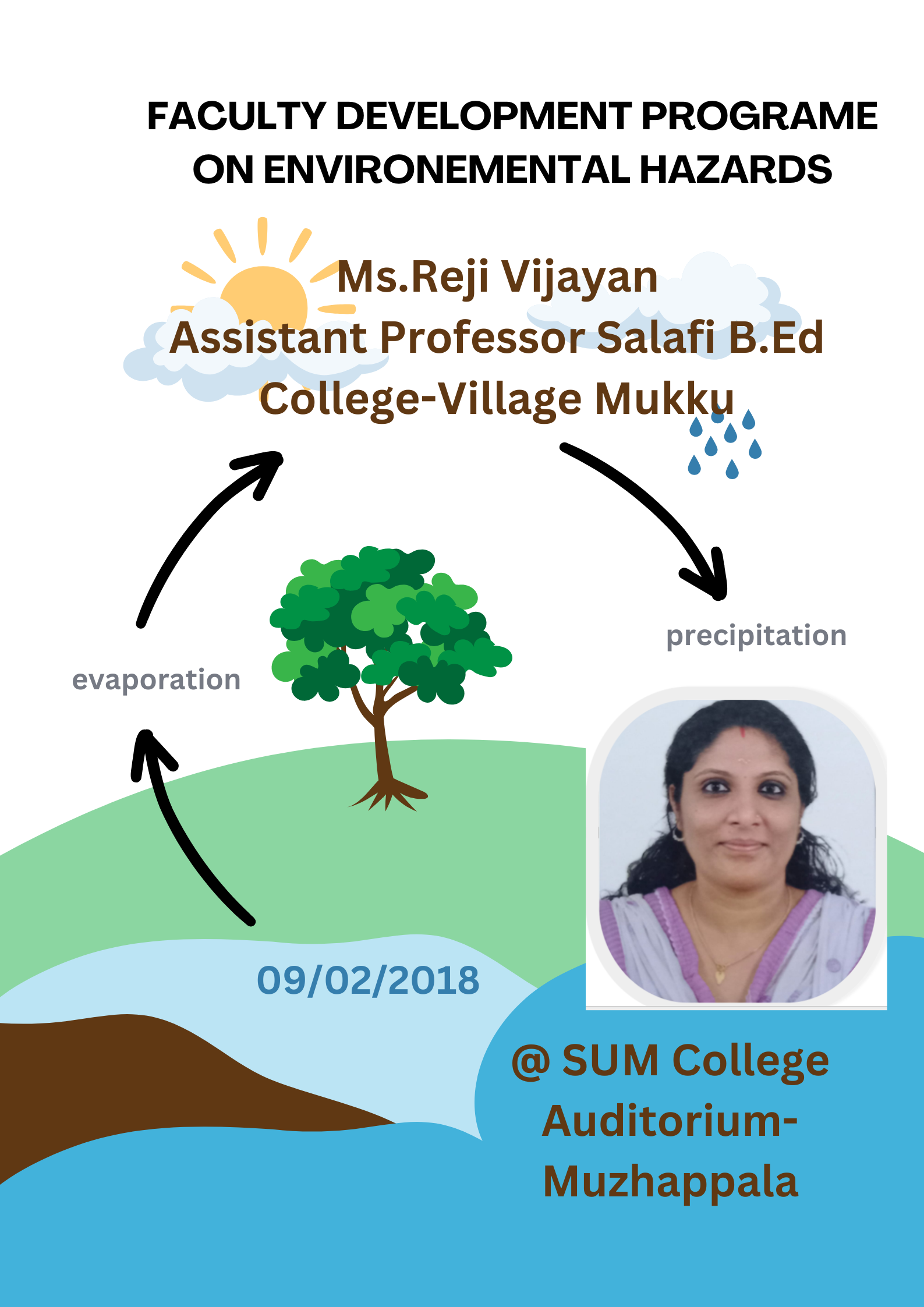Report on Faculty Development Program on Environmental Hazards
Title: Faculty Development Program on Environmental Hazards
Date: 9th February 2018
Venue: Sum College of Teacher Education, Muzhappala Auditorium
Resource Person: Ms. Reji Vijayan, Assistant Professor, Department of Natural Science, Salafi Bed College, Kannur
Introduction:
A Faculty Development Program (FDP) on Environmental Hazards was conducted on 9th February 2018 at the Sum College of Teacher Education, Muzhappala Auditorium. The program was led by Ms. Reji Vijayan, Assistant Professor of Natural Science at Salafi Bed College, Kannur. The session focused on educating faculty members about the various environmental hazards that affect ecosystems and human health, alongside the essential environmental policies that aim to mitigate these risks.
Objective:
The primary objective of the FDP was to raise awareness about environmental hazards and their implications. It aimed at providing an in-depth understanding of the current environmental challenges, the importance of sustainability, and the role of educators in fostering environmental consciousness among students.
Key Highlights:
- Introduction to Environmental Hazards: Ms. Reji Vijayan began by defining environmental hazards as natural or man-made factors that negatively affect the environment, biodiversity, and human health. The session covered various types of hazards, including air pollution, water contamination, deforestation, climate change, and industrial waste.
- Impact on Health and Ecosystems: The resource person discussed how environmental hazards lead to significant health issues like respiratory diseases, waterborne illnesses, and the long-term effects of chemical exposure. Additionally, the degradation of ecosystems, loss of biodiversity, and disruptions in food security were also addressed.
- Environmental Policies and Legal Frameworks: Ms. Vijayan elaborated on key environmental policies and legislation aimed at controlling and preventing environmental hazards. These included national and international frameworks such as the Environmental Protection Act, Kyoto Protocol, and Paris Agreement. The role of government bodies, local authorities, and international organizations in implementing these policies was emphasized.
- Sustainability and the Role of Educators: The importance of sustainability was highlighted, stressing the need for reducing environmental footprints and adopting green practices. Faculty members were encouraged to integrate environmental education into their teaching curriculum to cultivate eco-friendly practices among future generations.
- Interactive Discussion: An engaging discussion followed the presentation, where participants shared their insights and discussed local environmental challenges, such as waste management and pollution control. Ms. Vijayan provided practical tips on how educators can contribute to environmental preservation in their daily activities and teaching.
Conclusion:
The Faculty Development Program on Environmental Hazards was an informative and insightful session that equipped faculty members with the knowledge and tools to understand and address environmental issues. The program also fostered a deeper sense of responsibility among educators to promote sustainability and environmental awareness within their institutions and communities.
Outcome:
The FDP successfully raised awareness among the participants about the critical environmental challenges facing the world today. The faculty members left the session with a renewed commitment to integrating environmental education into their teaching practices and spreading awareness about the importance of protecting the environment for future generations.

